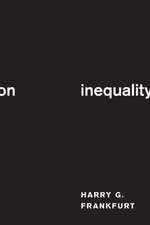W. V. Quine
Autor Alex Orensteinen Limba Engleză Paperback – 28 feb 2002
Preț: 346.64 lei
Nou
66.34€ • 68.84$ • 55.45£
Carte tipărită la comandă
Livrare economică 17-31 martie
Specificații
ISBN-10: 0691096066
Pagini: 224
Dimensiuni: 145 x 216 x 12 mm
Greutate: 0.28 kg
Ediția:New.
Editura: Princeton University Press
Locul publicării:Princeton, United States
Cuprins
1 Introduction 1
2. Expressing an ontology 11
The new way of construing existence claims 11
The new logic: a canonical notation 15
The semantic side of ontological commitment 24
Challenging Quine on expressing existence 34
3. Deciding on an ontology 39
Some rival twentieth-century ontologies 39
Opting for an ontology: indispensability arguments 46
Quine's ontology 52
Conflict with Carnap over ontology 61
Inscrutability of reference 67
Challenging Quine: indispensability arguments 71
4. The spectre of a priori knowledge 75
The problem of a priori knowledge 75
Duhemian-Holistic empiricism and the dogma of reductionism 79
The effects of dispensing with the a priori 87
Challenging Quine: naturalism and the a priori 88
5. The nature of logic 95
Analyticity as logical truth 95
Expressing the principles of logic and set theory 100
Are logic and mathematics true by convention? 107
Challenging Quine: a broader conception of logic 114
6. Analyticity and indeterminacy 119
Dispensing with meanings 121
Other attempts to explicate analyticity 127
The indeterminacy conjecture 133
Contrasting indeterminacy and underdetermination 139
Contrasting inscrutability of reference and indeterminacy of meaning 142
Challenging Quine: analyticity and indeterminacy 147
7. Intensional contexts 149
Modal logic 151
The quotation paradigm 152
De dicto and de re modality: quotation and essentialism 155
Challenginq Quine: possible world semantics and the new theory of reference 159
Propositional attitudes 165
Challenging Quine: attitudes without objects 169
8. Nature, know thyself 173
Epistemology naturalized 173
A natural history of reference 178
Challenging Quine on epistemology 185
Bibliography 201
Index 207
Textul de pe ultima copertă
"Orenstein's thorough knowledge both of Quine and of philosophical logic put him in an ideal position to explain and discuss Quine's seminal contributions. He does it with clarity and accuracy, and to his illuminating exposition he adds perceptive comment and incisive criticism. This is an outstanding account of Quine's thought, and will be invaluable to anyone seeking a really good, accessible and insightful introduction to it."--A. C. Grayling, Birkbeck College, University of London
"This presentation of Quine's philosophy is not only a good textbook but also a contribution to Quine scholarship. Written at a level suitable for philosophy majors and beginning graduate students as well as interested laymen, the book is well organized, precise, easy to follow, and includes good examples."--Dagfinn Follesdal, Stanford University and Oslo University
"This is a useful and sympathetic introductory account of the main philosophical views of the late W.V.O. Quine. Its straightforward account of what Quine says and why he says it will be useful to students and others wishing to understand Quine's views."--Gilbert Harman, Princeton University
"












